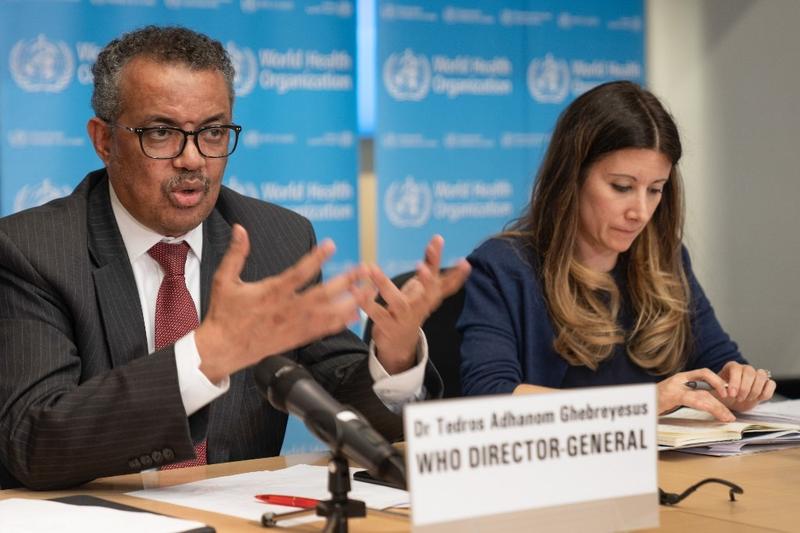 This handout picture made available by the World Health Organization (WHO) shows WHO Director-General Tedros Adhanom Ghebreyesus (left) speaking next to WHO Technical Lead Maria Van Kerkhove during a virtual press briefing on COVID-19. At the WHO headquarters in Geneva on March 16, 2020. (CHRISTOPHER BLACK / WORLD HEALTH ORGANIZATION / AFP)
This handout picture made available by the World Health Organization (WHO) shows WHO Director-General Tedros Adhanom Ghebreyesus (left) speaking next to WHO Technical Lead Maria Van Kerkhove during a virtual press briefing on COVID-19. At the WHO headquarters in Geneva on March 16, 2020. (CHRISTOPHER BLACK / WORLD HEALTH ORGANIZATION / AFP)
LAUSANNE/ZURICH/GENEVA - The World Health Organization called on all countries on Monday to ramp up their testing programs as the best way to slow the advance of the coronavirus pandemic, and also urged companies to boost production of vital equipment to overcome acute shortages.
“We have a simple message to all countries - test, test, test,” WHO Director-General Tedros Adhanom Ghebreyesus said at a news conference in Geneva, calling the pandemic “the defining global health crisis of our time”.
All countries should be able to test all suspected cases, they cannot fight this pandemic blindfolded.
Tedros Adhanom Ghebreyesus, WHO director-general
“All countries should be able to test all suspected cases, they cannot fight this pandemic blindfolded.”
Without testing, cases cannot be isolated and the chain of infection will not be broken, he said.
Tedros said that more COVID-19 cases and deaths have now been reported in the rest of the world than in China, noting that a rapid escalation of the coronavirus cases has been seen in the past week.
ALSO READ: WHO: Europe is new epicenter of coronavirus pandemic
As of Monday morning, a total of more than 83,000 confirmed cases of COVID-19 have been reported outside China, exceeding the cumulative number of infections in China, and over 6,400 patients have died of COVID-19 worldwide, according to the WHO.
"We have seen a rapid escalation in social distancing measures, like closing schools, canceling sporting events and other gatherings." Tedros said.
However, Tedros warned that escalation in testing, isolation and contact tracing was not urgent enough.
The most effective way to prevent infections and save lives is breaking the chains of COVID-19 transmission, said Tedros.
He said the strategy to contain the disease - identifying people with infections and rapidly isolating them - was still the best approach, and had shown positive effects in China, South Korea and Singapore.
In addition, Tedros said the WHO advised all confirmed COVID-19 cases, including mild cases, to be isolated in health facilities to prevent transmission.
He added countries and regions, which have exceeded their capacity to care for mild cases in dedicated health facilities, should prioritize older patients and those with underlying conditions.
Even countries with advanced health systems have struggled to cope with the outbreak, Tedros noted, adding he was deeply concerned about its effects on low-income countries where people already struggled with malnutrition and other health problems.
READ MORE: 'We are at war': France imposes lockdown to combat virus
Many countries have limited testing to the old or with pre-existing conditions, refusing tests for others with milder symptoms who can nevertheless spread the virus. Often they simply do not have the resources to carry out more tests.
Paul Molinaro, in charge of operations, support and logistics at the WHO, called for “a change in mindset” to overcome supply shortages in items such as test kits and protective equipment to fight the pandemic.
“Is this a challenge? It is. Is it easy? No it’s not. Is there a chance we can get availability and get this equipment? We remain optimistic,” he said at the same news conference, referring to “severe market constraints” for some equipment.
Tedros said the WHO was working with the private sector to increase production of protective equipment, describing the current shortage as a “market failure”. He also warned against hoarding of supplies.
Meanwhile, Tedros, who was upbeat enough to make a joke in Spanish, said he was cheered by the response from governments coming forward with funding to fight the outbreak.
“It’s not just the funding, it is human spirit which we see, that is fighting this virus, that is coming more strongly,” he added. “I am really encouraged in the last week or so with the solid level of solidarity I see.”


